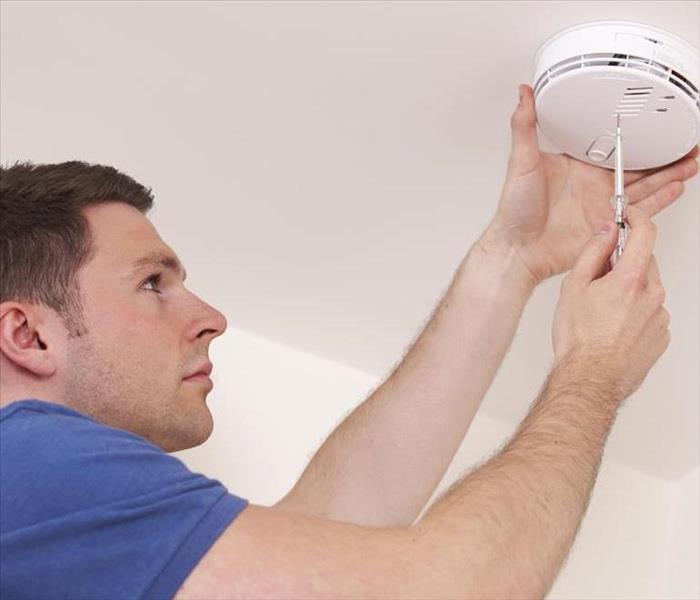Smoke Detectors: Protect Your Home or Business from Fire
7/1/2021 (Permalink)
 Changing your smoke detector's batteries is easy, and guarantees smoke and fires don't go unnoticed.
Changing your smoke detector's batteries is easy, and guarantees smoke and fires don't go unnoticed.
Checking smoke alarms on a regular basis is an important element of home and building maintenance that will keep your house or company safe. Smoke detector checks are a simple and effective way to safeguard your building and its occupants from smoke and fire emergencies, and keeping yours in good working order doesn't take much effort. Make sure your smoke detectors are working properly by following the guidelines below.
Why check smoke alarms?
Smoke alarms are one of the few products in your house or business that can genuinely save lives in the event of a fire. According to the National Fire Prevention Association, house fires are more than twice as likely to turn deadly in homes without functional smoke detectors. Whether it's a large commercial facility that takes additional time to evacuate or family home full of individuals who are sleeping, providing as much time as possible to flee the premises is critical during a fire. Working smoke alarms provide important early notice which can directly affect the survival of valued family and employees.
Tips for checking smoke detectors
While smoke detector technology has improved and become more dependable than ever before, it is still necessary to inspect and test yours on a regular basis. To conduct a complete smoke detector check in your home or office, follow these suggestions from the experts at SERVPRO Kaufman County & Cedar Creek. Enjoy daily peace of mind knowing that you'll have life-saving assistance when you need it most.
- Be compliant: The National Fire Protection Association (NFPA) maintains fire prevention rules and requirements for all types of occupancies. To guarantee you have the most up-to-date information and are in compliance, look into the National Fire Alarm and Signaling Code and the Life Safety Code from the National Fire Protection Association (NFPA).
- Adhere to manufacturer guidelines: The maker of your smoke detectors will provide model-specific maintenance and testing recommendations for your home or company. All documentation should be kept so that you can refer to it as needed.
- Check to see what types of smoke detectors are installed: Smoke detectors are divided into two types that are typically seen in homes and workplaces. A smoke alarm that runs on batteries is common in homes and may be fitted almost anyplace. An AC-powered (hard-wired) smoke detector is better suited for long-term use and is commonly found in commercial buildings.
- Alert your family/employees and run tests. Smoke detectors emit a high-pitched sound that may offend or frighten some members of your family, staff, or customers. Everyone will be able to shield their ears or prepare for the sound if they are given advance notice prior to smoke alarm testing.
- Assign someone to stand at the furthest location from the alarm: While the sound of a smoke alarm test may be audible close to the device, it may not be audible elsewhere on your property. Consider installing another smoke alarm in that area if the sound is low or muffled.
- Monthly testing: Use the integrated test button to check every smoke alarm in the building at least once a month. To indicate that the device is receiving electricity, some newer models have flashing or steady LEDs that shine. Other models are linked, allowing you to test them all at the same time.
- Replace the batteries in your smoke detectors at least once a year if they have a replaceable battery. Do not wait until your alarms begin to chirp before replacing the batteries. Make a note of it and make sure you're always safe. When you adjust your clocks for daylight savings time, it's a good idea to replenish your batteries.
- Replace smoke detectors every ten years or 87,000 hours to guarantee you have the most up-to-date technology and the finest protection possible. Even "long-life" smoke alarms must be changed after 10 years since non-removable lithium batteries only have a 10-year guarantee. This is necessary owing to a buildup of impurities in the internal sensors.
Protect your home or business by maintaining your smoke detectors.
Any home or business can be destroyed by a fire. While SERVPRO's remediation experts are here to help you recover from smoke or fire damage to your home or company, you can make sure the right safety procedures and equipment are in place to keep your family and coworkers safe and minimize fire damage in an emergency.




 24/7 Emergency Service
24/7 Emergency Service